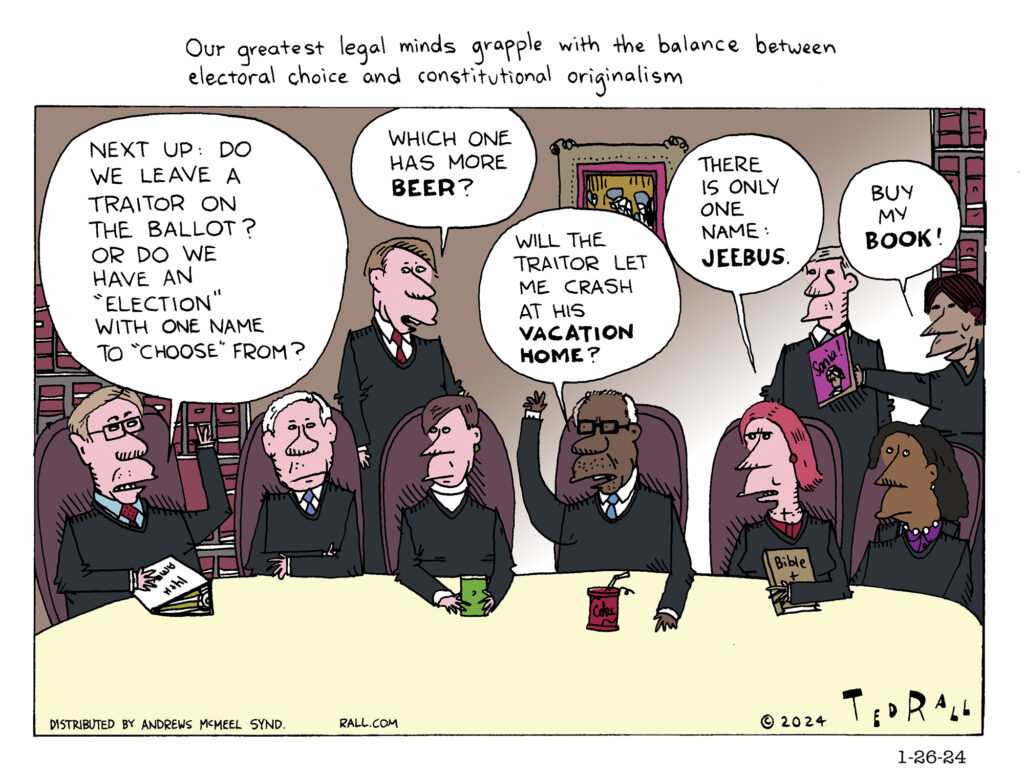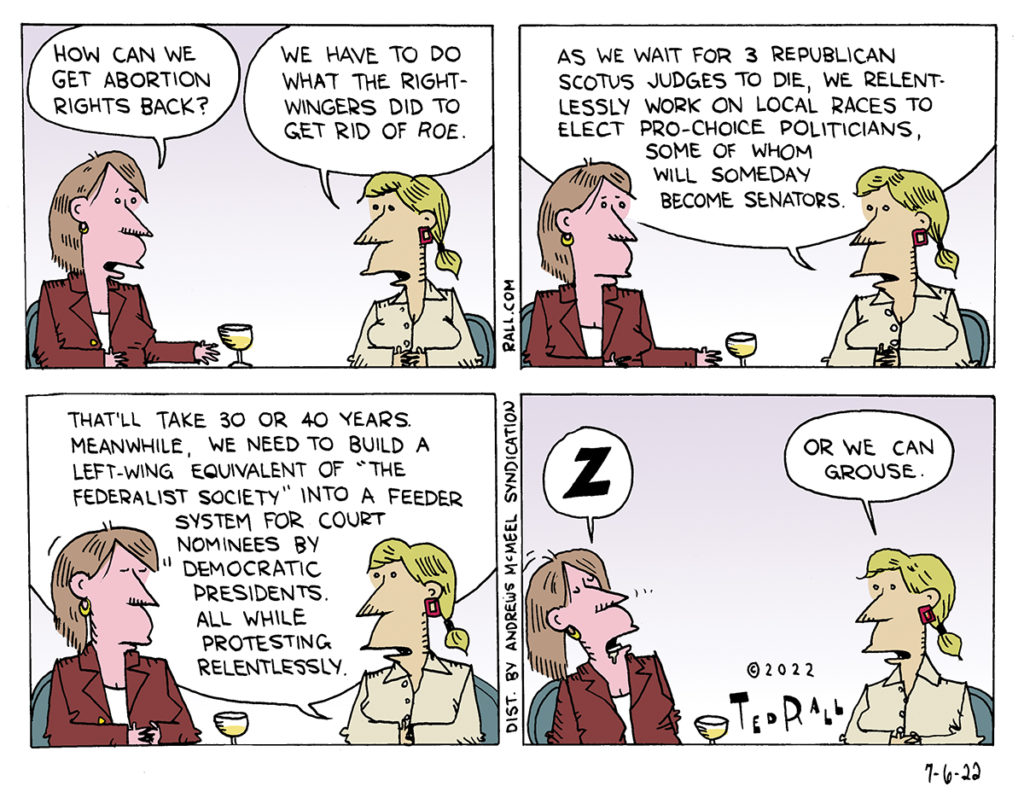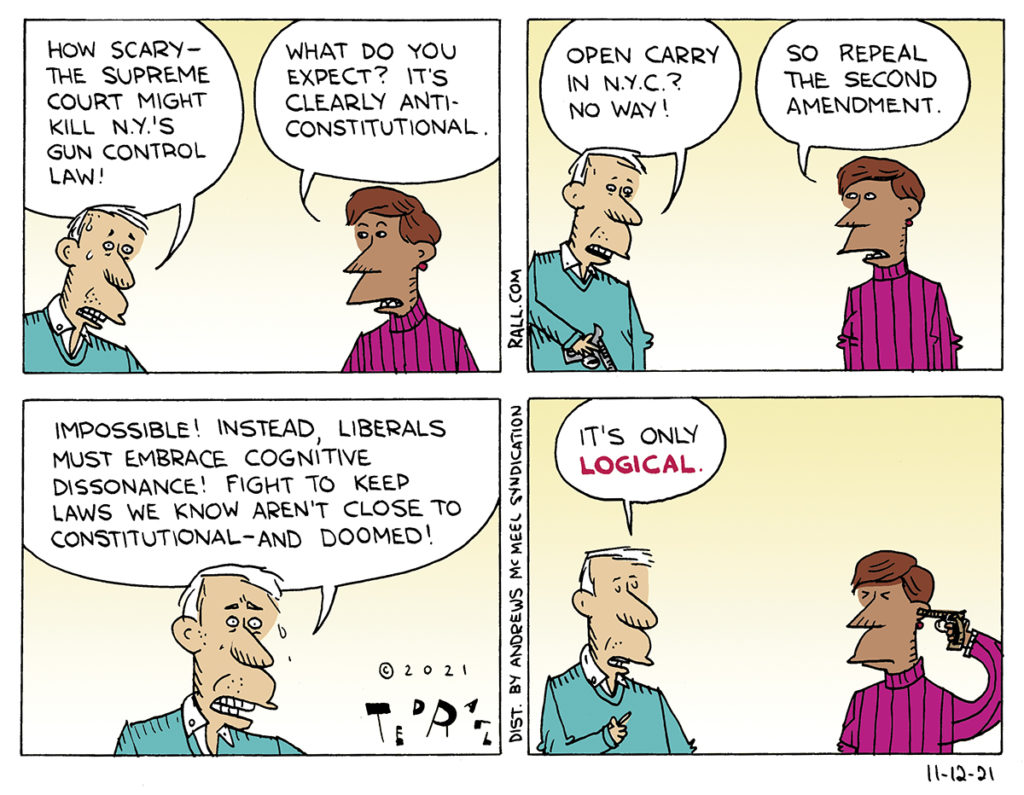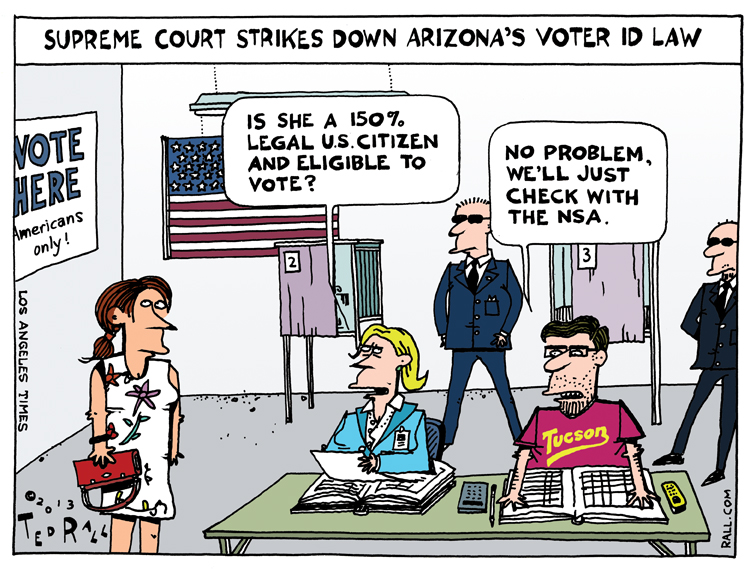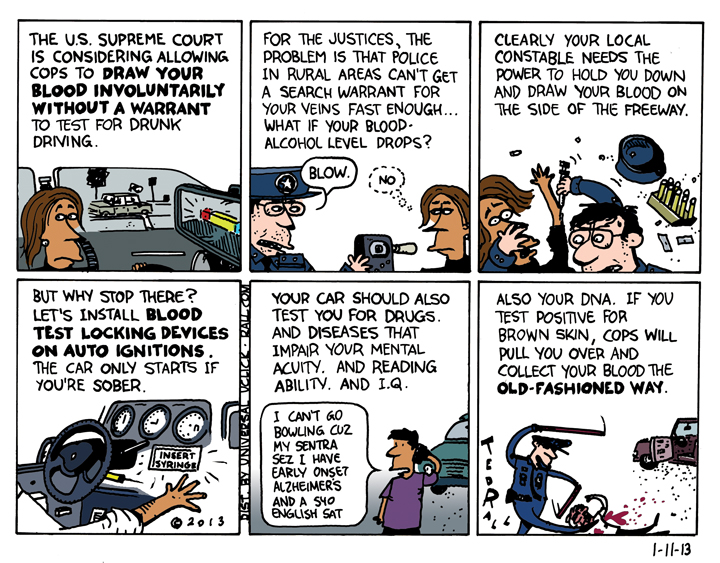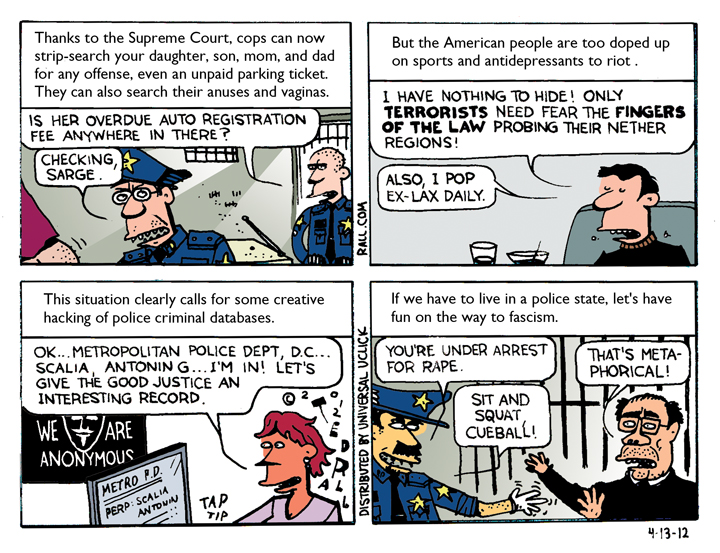The Supreme Court has agreed to consider the vexing question of whether Donald Trump should be disqualified from the presidential ballot under the 14th Amendment prohibition against insurrectionists. Too bad we don’t have smarter jurists.
When the Constitution Threatens Democracy
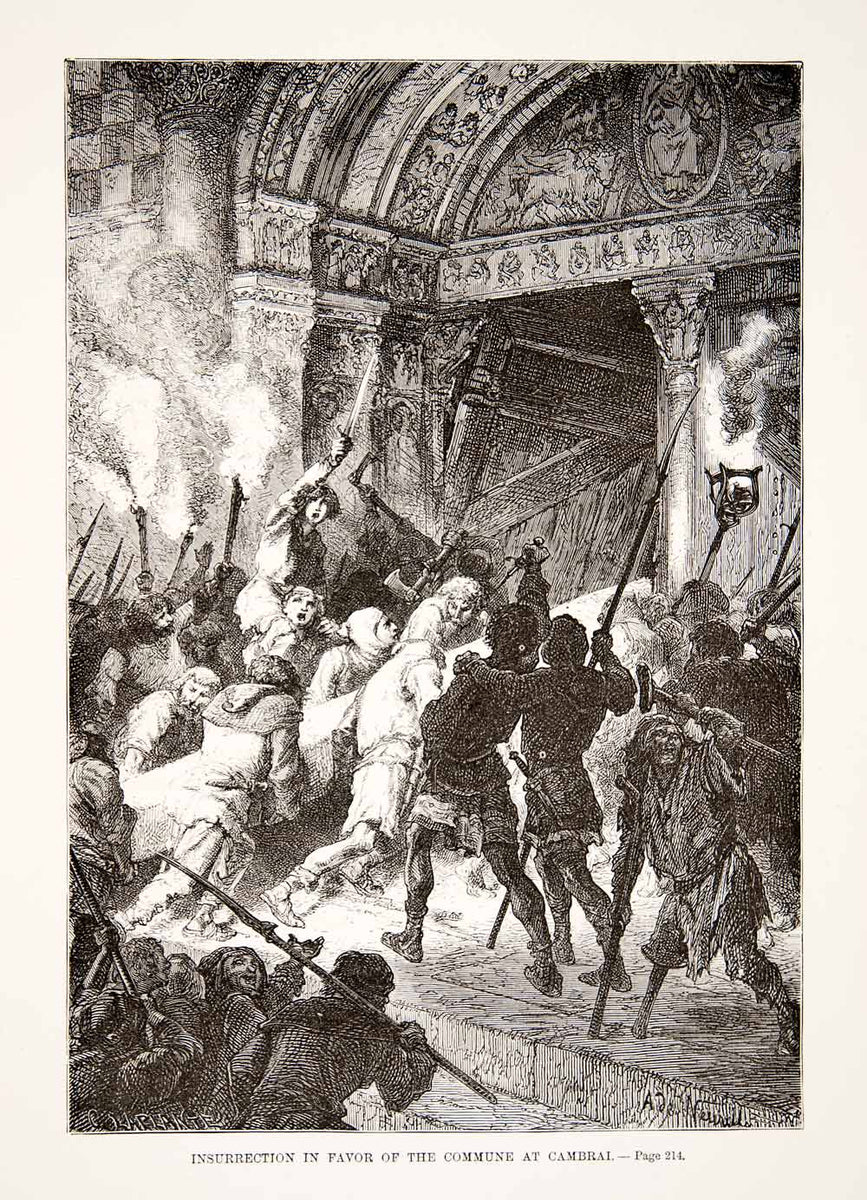
The Supreme Court faces a quandary: It must choose between democracy and the Constitution.
Compared to Trump v. Anderson, the notorious case of Bush v. Gore was a straightforward affair: it should not have been heard. Because elections are administered by the states, the Florida Supreme Court’s 2000 ruling ought to have been the last word. The recount should have continued. Setting aside the noxious optics of a party-line court deciding an election, the Supreme Court’s decision to hear Bush in the first place was unconstitutional.
That view is bipartisan. Sandra Day O’Connor, the justice who cast the tie-breaking vote in the 5-4 decision, eventually conceded that she regretted her partisan hackery. The court declined to officially publish Bush so it can never be cited as a precedent, a tacit admission that it made lousy case law. Chief Justice John Roberts, who subsequently spent much of his nearly two decades on the bench trying to restore the court’s tarnished reputation, never wanted his court to hear another election dispute.
With attempts to remove Donald Trump from the ballot on the ground that he’s disqualified under the 14th Amendment’s prohibition against insurrectionists holding high office spreading from Colorado to Maine to dockets in 14 other states, the Roberts court has no choice but to weigh in. States need the guidance of an across-the-board standard issued by the nation’s legal referee.
This train wreck reminds me of how, as late as the 1970s, European beachgoers were occasionally still getting blown up by mines placed during World War II; old and forgotten doesn’t always mean dead and gone. Section 3 of the 14th Amendment should have been repealed 150 years ago. Sadly for the Republic this legal time-bomb, long hidden in plain sight, is finally going off.
Ratified in 1868 just after the Civil War, the 14th Amendment’s prohibition on citizens who had participated in insurrection or rebellion from holding high office was soon rendered obsolete, a legal version of the human appendix, by the postwar Ulysses Grant Administration’s blanket Amnesty of 1872. In a bid to reunify a fractured nation all former officers of the Southern government, including notorious figures like former Confederate President Jefferson Davis and John C. Breckinridge, the U.S. Vice President from 1857 to 1861 who became the Confederacy’s Secretary of War, received pardons.
The forgiveness was real. Nine former Confederates were elected to Congress including Alexander Stephens, the former Confederate Vice President. President Grant encouraged Breckinridge to reenter politics but he declined.
For all practical purposes, Section 3 died at the age of four. (Which is why there’s no helpful case law.) Yet, like the New York “blue law” that makes it a crime to carry an ice cream cone in your back pocket in public on Sundays, this historical curio has remained on the books since the era of the horse and buggy, forgotten until some enterprising attorneys for some plaintiffs in Colorado resuscitated this legal relic for their novel assault against Trump.
Rep. Jamie Raskin (D-MD), a former constitutional law professor, argues that the 14th Amendment can’t isn’t undemocratic because it’s in the Constitution: “If you think about it, of all of the forms of disqualification that we have, the one that disqualifies people for engaging in insurrection is the most democratic because it’s the one where people choose themselves to be disqualified.” Slavery was in the Constitution too.
Trump has such a commanding lead in the primaries that he will almost certainly be the Republican presidential nominee. We have a two-party system. You don’t have to be a constitutional scholar to see that knocking one out of two of the major-party presidential candidates—who happens to be ahead in the polls—off the ballot is inherently undemocratic as well as a perfect recipe for political unrest.
The last time a major presidential candidate didn’t appear on some state ballots was Abraham Lincoln in 1860. Trouble ensued.
Trump probably deserves to be disqualified. But this is not about him. Disenfranchising tens of millions of his supporters would be deeply destabilizing to democracy. How better to feed into Trump’s narrative that our elections are rigged than to deprive voters of the basic choice to vote for or against him?
The plain language of the 14th Amendment does not offer much hope to Trump and the Republicans as they argue before a Supreme Court dominated by originalists. The Colorado Supreme Court was probably correct when they determined that the offices of president and vice president were originally intended to be covered by the provision. There is a strong argument that January 6, 2021 qualified as an insurrection or rebellion as the amendment’s drafters understood those terms in 1866. Section 3 appears to be intended to be self-executing, meaning that appeals to due process are unlikely to prevail; like it or not, a secretary of state or state supreme court can simply look at Donald Trump and declare: I see an insurrectionist. Section 5, which allows Congress to make such a determination, describes a non-exclusive right.
If the Roberts court follows Section 3 to the letter, Trump will be disqualified.
Theoretically, Congress could solve this dilemma. A two-thirds vote in both the House and the Senate would allow Trump to remain on the ballot. Democrats could declare that they value democracy so much and have so much confidence in American voters to do the right thing in a fair election that they would provide the necessary support. But such an extraordinary gambit would require statesmanship, risk-taking and putting patriotism above party, traits in short supply on Capitol Hill.
We Americans venerate the Constitution. But Section 3 of the 14th Amendment is a nightmare. Given the choice between correctly interpreting the original intent of its Reconstruction-era drafters and allowing the 2024 election to proceed as normally as possible given the advanced ages of both frontrunners and the legal perils faced by Trump, the Supreme Court construct a convoluted rationale for, say, why the presidency isn’t a government office or how the 14th contains an implied right to due process.
The Supreme Court should ignore the Constitution, gin up a BS justification to keep Trump on the ballot and choose democracy.
(Ted Rall (Twitter: @tedrall), the political cartoonist, columnist and graphic novelist, co-hosts the left-vs-right DMZ America podcast with fellow cartoonist Scott Stantis. You can support Ted’s hard-hitting political cartoons and columns and see his work first by sponsoring his work on Patreon.)
But Restoring Abortion Is Hard
Voting Democratic will not get abortion rights back. Pro-choice advocates will have to do exactly what the pro-life movement did over the course of half a century in order to reverse this devastating loss of women’s rights. Given the fact that there is no organized left-wing movement in the United States, however, the outlook currently looks bleak.
Voter ID Law Struck Down
I draw cartoons for The Los Angeles Times about issues related to California and the Southland (metro Los Angeles).
This week: The US Supreme Court has stricken down Arizona’s Voter ID law. Fortunately, there are other ways to get information about people.
Vein Rape
The US Supreme Court is currently considering allowing police to draw your blood involuntarily without a warrant in the event that you refuse a breathalyzer test if you are suspected of drunk driving. It is an incredibly invasive procedure, but the authorities and the courts are siding with the cops because, incredibly, they complained that sometimes it is too difficult to get search warrants for your veins and arteries quickly enough before your blood alcohol level dissipates to legal levels.
Obama’s Argument for Reelection
He didn’t do dick about foreclosures. He barely tried to stimulate the economy. His healthcare plan is shit. On human rights he’s worse than Bush, who wouldn’t have dared argue in favor of assassinating innocent U.S. citizens.
But fear not: the Dipshit-in-Chief has what Democrats think will be a potent argument to get liberals to turn out this fall: if Romney gets in, the Supreme Court will get even worse.
Which is hard to imagine. This, after all, is a Supreme Court that just legalized finger-rape by cop and strip-searching for any and all citizens arrested for any reason whatsoever. What will Romney’s right-wing SCOTUS do, approve finger-rape by a 6-3 majority instead of 5-4?
Still, no one ever went broke underestimating the intelligence of American voters (c.f., 2004).
AL JAZEERA COLUMN: How the US Media Marginalizes Dissent
The US media derides views outside of the mainstream as ‘un-serious’, and our democracy suffers as a result.
“Over the past few weeks, Washington has seemed dysfunctional,” conservative columnist David Brooks opined recently in The New York Times. “Public disgust [about the debt ceiling crisis] has risen to epic levels. Yet through all this, serious people—Barack Obama, John Boehner, the members of the Gang of Six—have soldiered on.”
Here’s some of what Peter Coy of Business Week magazine had to say about the same issue: “There is a comforting story about the debt ceiling that goes like this: Back in the 1990s, the U.S. was shrinking its national debt at a rapid pace. Serious people actually worried about dislocations from having too little government debt…”
Fox News, the Murdoch-owned house organ of America’s official right-wing, asserted: “No one seriously thinks that the U.S. will not honor its obligations, whatever happens with the current impasse on President Obama’s requested increase to the government’s $14.3 trillion borrowing limit.”
“Serious people.”
“No one seriously thinks.”
The American media deploys a deep and varied arsenal of rhetorical devices in order to marginalize opinions, people and organizations as “outside the mainstream” and therefore not worth listening to. For the most part the people and groups being declaimed belong to the political Left. To take one example, the Green Party—well-organized in all 50 states—is never quoted in newspapers or invited to send a representative to television programs that purport to present “both sides” of a political issue. (In the United States, “both sides” means the back-and-forth between center-right Democrats and rightist Republicans.)
Marginalization is the intentional decision to exclude a voice in order to prevent a “dangerous” opinion from gaining currency, to block a politician or movement from becoming more powerful, or both. In 2000 the media-backed consortium that sponsored the presidential debate between Vice President Al Gore and Texas Governor George W. Bush banned Green Party candidate Ralph Nader from participating. Security goons even threatened to arrest him when he showed up with a ticket and asked to be seated in the audience. Nader is a liberal consumer advocate who became famous in the U.S. for stridently advocating for safety regulations, particularly on automobiles.
AL JAZEERA COLUMN: Too Soon To Tell
I am pleased to announce that I am now writing a weekly long-form column for Al Jazeera English. Here is my second piece for Al Jazeera:
One Year Early, Obama’s Reelection Far From Certain
The American punditocracy (and, perhaps more importantly, Las Vegas oddsmakers) currently cite Barack Obama as their odds-on favorite to win next year’s presidential election. Some even predict a landslide.
Mainstream media politicos acknowledge the atrocious economy, with its real unemployment rate nearly matching the worst years of the Great Depression of the 1930s, as an obstacle to reelection. But most of them believe that other factors will prove decisive: disarray in the field of candidates for the nomination of the opposition Republican Party, the GOP’s reliance on discredited Reagan-style austerity measures for the masses coupled with tax cuts for the wealthy, and Obama’s assassination of Osama bin Laden.
Maybe they’re right. But if I were the President, I wouldn’t be offering the White House chef a contract renewal any time soon. Count me among the majority of Americans (54 to 44 percent) who told a March 2011 CNN/Opinion Research poll they think Obama will lose the 2012 election.
I could be wrong.
Scott Keeter, director of survey research at the Pew Research Center, doesn’t think much of these so-called “trial-run” polls. “A review of polls conducted in the first quarter of the year preceding the election found many of them forecasting the wrong winner—often by substantial margins,” Keeter wrote in 2007, citing three elections as far back as 1968.
However, a historical analysis of the more recent presidential races, those over the two decades, reveals an even bigger gap. The year before a U.S. presidential election, the conventional wisdom is almost always wrong. The early favorite at this point on the calendar usually loses. So betting against the pundits—in this case, against Obama—is the safe bet at this point.
The meta question is: what difference does it make who wins next year? In practical terms, not much.
For one thing, American presidents tend to find more heartbreak than political success during their second terms. Had Richard Nixon retired in 1972, for example, he would have been fondly remembered as the architect of the Paris peace talks that ended the Vietnam War, the founder of the Environmental Protection Agency, and the defender of the working and middle class (for imposing wage and price controls to soften the effect of inflation). His second term saw him sinking into, and ultimately succumbing, to the morass of the Watergate scandal.
The next second termer, Ronald Reagan, was similarly preoccupied by scandal, in case the Iran-Contra imbroglio in which the United States traded arms to Iran in return for hostages held by students in Tehran and illegally funded right-wing death squads in Central America. Bill Clinton’s last four years were overshadowed by his developing romance, and the consequences of the revelation thereof, with intern Monica Lewinsky. George W. Bush’s second term, from 2005 to 2009, was defined by his administration’s inept response to hurricane Katrina in New Orleans, the deteriorating security situation in U.S.-occupied Afghanistan and Iraq, and the economic collapse that began in 2008. His number-one political priority, privatizing the U.S. Social Security system, never got off the ground.
Presidents rarely accomplish much of significance during their second term. So why do they bother to run again? Good question. Whether it’s ego—1600 Pennsylvania Avenue is one hell of an address—or something else, I don’t know. Whatever, I have long maintained that a sane president would think of himself as standing for one four-year term, then announce his intention not to run again at the last possible moment.
From the standpoint of the American people and the citizens of countries directly affected by U.S. foreign policy, it is unlikely that the basic nature of the beast will change much regardless of Obama’s fortunes in the next election. One only has to consider the subtle “differences” between the tenures of Presidents Bush and Obama.
On the domestic front Obama continued and expanded upon Bush’s non-reaction to the economic crisis, exploiting the panic created by widespread unemployment, the bursting of the housing bubble and a massive foreclosure crisis that put tens of millions of Americans out of their homes in order to pour hundreds of billions of federal dollars into the pockets of the top executives of the nation’s largest banks, with no resulting stimulus effect whatsoever. Controversial attacks on privacy rights and civil liberties inaugurated by the Bush years were expanded and extended: the USA-Patriot Act, the National Security Agency “domestic surveillance” program that allowed the government to spy on U.S. citizens’ phone calls, emails and other communications. Obama even formalized Bush’s assertion that the president has the right to unilaterally order the assassination of anyone, including a U.S. citizen, without evidence or proof that he or she has committed a crime.
As promised during the 2008 campaign, Obama expanded the U.S. war against Afghanistan, transforming what Bush described as a short-term attempt to find Osama bin Laden after 9/11 into the most protracted military conflict in the history of the United States. The war continued in Iraq, albeit with “combat” troops redefined as “trainers.” During the last few years, the “global war on terror” expanded into Pakistan, east Africa, Libya and Yemen. Drone attacks escalated. Violating his campaign promises, he continued to keep torture available as a legal option—indeed, he ordered it against a U.S. solder, Private First Class Bradley Manning—and kept Guantánamo and other Bush-era concentration camps open.
If Obama goes down to defeat next year, then, the results should be viewed less as a shift in overall U.S. policy—hegemonic, imperialistic, increasingly authoritarian—than one that is symbolic. An Obama defeat would reflect the anger of ordinary Americans caught in the “two-party trap,” flailing back and forth between the Dems and the Reps, voting against the party in power to express their impotent rage, particularly at the economy. Mr. Hopey-Changey’s trip back to Chicago would mark the end of a brief, giddy, moment of reformism.
The argument that an overextended, indebted empire can be repaired via internal changes of personnel would be dead. With the reformism that Obama embodied no longer politically viable, American voters would be once again faced, as are the citizens of other repressive states, with the choice between sullen apathy and revolution.
Obamaism is currently believed to be unstoppable. If history serves as an accurate predictor, that belief is good cause to predict its defeat next November.
During the late spring and early summer of 1991, just over a year before the 1992 election, President George H.W. Bush was soaring in the polls in the aftermath of the Persian Gulf War, which the American media positively portrayed as successful, quick, internationalist, and cost the lives of few America soldiers. A March 1991 CBS poll gave him an 88 percent approval rating—a record high.
By October 1991 Bush was heavily favored to win. A Pew Research poll found that 78 percent of Democratic voters thought Bush would defeat any Democratic nominee. New York governor Mario Cuomo, an eloquent, charismatic liberal star of the party, sized up 1992 as unwinnable and decided not to run.
When the votes were counted, however, Democrat Bill Clinton defeated Bush, 43 to 37.5 percent. Although Republicans blamed insurgent billionaire Ross Perot’s independent candidacy for siphoning away votes from Bush, subsequent analyses do not bear this out. In fact, Perot’s appeal had been bipartisan, attracting liberals opposed to the North American Free Trade Agreement (NAFTA) between the U.S., Canada and Mexico and globalization in general, as well as conservative deficit hawks.
The most credible explanation for Bush’s defeat was handwritten on a sign that the victorious Bill Clinton’s campaign manager famously taped to the wall of the Dems’ war room: “It’s the economy, stupid.” As the 1989-1993 recession deepened Bush’s ratings tumbled to around 30 percent. A February 1992 incident, in which Bush was depicted by The New York Times as wearing “a look of wonder” when confronted with a supermarket price scanning machine, solidified his reputation with voters as patrician, out of touch, and unwilling to act to stimulate the economy or alleviate the suffering of the under- and unemployed. “Exit polls,” considered exceptionally reliable because they query voters seconds after exiting balloting places, showed that 75 percent of Americans thought the economy was “bad” or “very bad.”
In 1995, Bill Clinton was preparing his reelection bid. On the Republican side, Kansas senator and 1976 vice presidential candidate Bob Dole was expected to (and did) win his party’s nomination. Perot ran again, but suffered from a media blackout; newspapers and broadcast outlets had lost interest in him after a bizarre meltdown during the 1992 race in which he accused unnamed conspirators of plotting to violently disrupt his daughter’s wedding. He received eight percent in 1996.
Clinton trounced Dole, 49 to 40 percent. In 1995, however, that outcome was anything but certain. Bill Clinton had been severely wounded by a series of missteps during his first two years in office. His first major policy proposal, to allow gays and lesbians to serve openly in the U.S. military, was so unpopular that he was forced to water it down into the current “Don’t Ask, Don’t Tell” compromise. Clinton’s 1993 attempt to deprivatize the healthcare system, mocked as HillaryCare after he put his wife in charge of marketing it, went down to defeat. He signed the pro-corporate, Republican-backed trade agreement, NAFTA, alienating his party’s liberal and progressive base. Low voter turnout by the American left in the 1994 midterm elections led to the “Republican Revolution,” a historic sweep of both houses of the American Congress by right-wing conservatives led by the fiery new Speaker of the House, Newt Gingrich.
1995 saw the so-called “co-presidency” between Gingrich and a cowed Bill Clinton, who was reduced to telling a press conference that “the president is relevant.” The United States, which does not have a European-style parliamentary system, had never seen a president so politically weak while remaining in office.
During the spring and summer of 1995 Bob Dole was already the heir apparent to the nomination of a Republican Party that traditionally rewards those who wait their turn. Dole was a seasoned campaigner, a Plains States centrist whose gentlemanly demeanor and credentials as a hero of World War II. Conventional wisdom had him beating Clinton. So did the polls. A March 1995 Los Angeles Times poll had Dole defeating Clinton, 52 to 44 percent in a head-to-head match-up. “Among all voters, Clinton’s generic reelect remains dismal, with 40 percent inclined to vote him in again and 53% tilting or definitely planning a vote against him,” reported the Times.
By late autumn, however, the polls had flipped. Though statisticians differ about how big a factor it was, a summer 1995 shutdown of the federal government blamed on the refusal of Gingrich’s hardline Republicans to approve the budget turned the tide. At the end of the year the die was cast. As Americans began to pay more attention to his challenger they recoiled at Dole’s age—if elected, he would have been the oldest president in history, even older than Reagan—as it contrasted with Clinton’s youthful vigor. The Democrat coasted to reelection. But that’s not how things looked at this stage in the game.
When analyzing the 2000 race, remember that Republican George W. Bush lost the election to Al Gore by a bizarre quirk of the American system, the Electoral College. The U.S. popular vote actually determines the outcome of elected delegates to the College from each of the 50 states. The winner of those delegates is elected president.
Most of the time, the same candidate wins the national popular vote and the Electoral College tally. In 2000, there is no dispute: Democrat Al Gore won the popular vote, 48.4 to 47.9 percent. There was a legal dispute over 25 electoral votes cast by the state of Florida; ultimately the U.S. Supreme Court decided, along party lines, to award the state to Bush despite clear indications that Gore would have won recounts by tens of thousands of votes in that state.
Regardless of one’s views of the 2000 Florida recount controversy, from a predictive standpoint, one should assume that Gore won because no one could have anticipated a difference between the results of the electoral and popular votes.
Under normal circumstances Gore should have faced, as Dick Cheney said about the Iraq invasion, a cakewalk. A popular sitting vice president, he enjoyed the trappings of incumbency and a reputation as a thoughtful environmentalist and government efficiency expert. The economy was booming—always a good argument for the “don’t change horses in midstream” sales pitch. The early favorite on the Republican side, George W. Bush, was considered an intellectual lightweight who would get eaten alive the first time the two met in a presidential debate. But Monicagate had wounded Bill Clinton to the extent that Gore made a fateful decision to disassociate himself from the president who had appointed him.
A January 1999 CNN poll had Bush over Gore, 49 to 46 percent. By June 2000 the same poll had barely budged: now it was 49 to 45 percent. “The results indicate that the public is far more likely to view Texas Governor George W. Bush as a strong and decisive leader, and is also more confident in Bush’s ability to handle an international crisis—a worrisome finding for a vice president with eight years of international policy experience,” analyzed CNN in one of the most frightening summaries of the American people’s poor judgment ever recorded.
Gore didn’t become president. But he won the 2000 election. Once again, the media was wrong.
In the 2004 election, it was my turn to screw up. Howard Dean, the combative liberal darling and former Vermont governor, was heavily favored to win the Democratic nomination against incumbent George W. Bush. I was so convinced at his inevitability after early primary elections and by the importance of unifying the Democratic Party behind a man who could defeat Bush that I authored a column I wish I could chuck down the memory hole calling for the party to suspend remaining primaries and back Dean. In 2004, John Kerry won the nomination.
Oops.
But I wasn’t alone. Polls and pundits agreed that George W. Bush, deeply embarrassed by the failure to find weapons of mass destruction in Iraq, would lose to Kerry, a Democrat with a rare combination of credentials: he was a bonafide war hero during the Vietnam War and a noted opponent of the war after his service there.
Bush trounced Kerry. “How can 59,054,087 people be so DUMB?” asked Britain’s Daily Mirror. Good question. Maybe that’s why no one saw it coming.
Which brings us to the most recent presidential election. First, the pundit class was wrong about the likely Democratic nominee. Former First Lady and New York Senator Hillary Rodham Clinton, everyone “knew,” would win. It wasn’t even close. An August 2007 Gallup/USA Today poll had Clinton ahead of Obama, 48 to 26 percent. As it turned out, many Democratic primary voters were wowed by Obama’s charisma and annoyed by Clinton’s refusal to apologize for her brazenly cynical vote in favor of the Iraq war in 2003. Aging Arizona Senator John McCain, on the other hand, remained the best-funded, and thus the continuous favorite, on the Republican side.
Obama’s advantages over McCain became clear by 2008. “The political landscape overwhelmingly favors Obama,” reported USA Today in June. At this point in 2007?
He didn’t stand a chance.
Ted Rall is an American political cartoonist, columnist and author. His most recent book is The Anti-American Manifesto. His website is rall.com.

